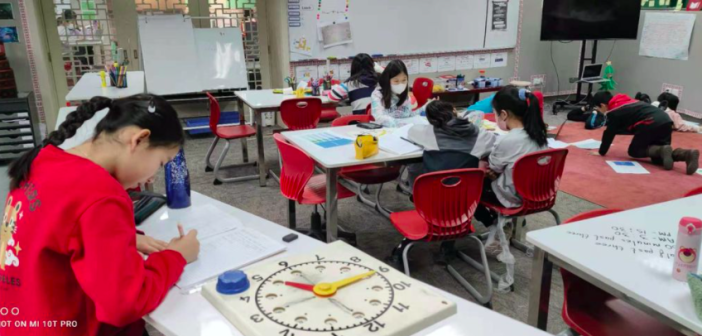“Finally, the exhibition is over and I can graduate elementary school! However, I heard from the Chinese teacher that the Chinese homework given in middle school is ten times the amount that it was in fifth grade! I also heard that there are eight subjects in middle school, and they all have grades given that matter to the semester grade. I also heard…” That was me in Grade 5, and little did I know that middle school was quite different from what I imagined.

Ever since I graduated fifth grade, which marked the end of my time in elementary school, I could not imagine what sixth grade or the rest of middle school would be like. Would it be full of stress and pressure? Or would there maybe be some occasional fun projects like I had in fifth grade?
When I got to middle school, the first big difference was that every single assessment and assignment was graded. As an IB student, elementary school did not have any grades that were given weekly. They were grades that were given at the end of the semester. However, because of this grading system, there would be no tolerance for a bad attitude when doing homework, as every assessment would count toward your semester grade in every subject.
I’m currently an incoming eighth grader at Beijing City International School (BCIS). We also have a system that awards students with an average semester grade that is higher than 5.7 for an “Honor,” and if the semester grade is higher than 6.3, it would be a “High Honor,” and the semester grade is the average of all the grades of all the final grades of all the subjects, which means that there is not one subject that a student can “give up on,” as all subjects matter when it comes to the final semester grade.
This system is also something that didn’t appear in elementary and it ensures that I do my best in every aspect of school, which is something I wasn’t used to at first, but as time went on I got used to it, and I have excelled in my studies in every subject. My peers often complain about how demanding the IB environment is, but they will always do the assignment very diligently.
Chloe L, an eighth grade student at BCIS, who almost always gets high grades and is in the same grade level as me, shared that “fifth graders have to get themselves ready for the vigorous environment and stay up late for big assessments!” Chloe’s friend Evelyn S, another eighth grade student at BCIS, also gets high grades and agrees that “even though I was not in BCIS in fifth grade, sixth grade was so different than elementary school because there were so many more assessments. No matter if it’s a formative assessment or summative assessment, it all counts!”
Everyone’s heard of those dreaded tween years. The 2003 film Thirteen gave parents anxiety at the idea of their once sweet little girls succumbing to peer pressure and bad influences at school. While it’s true that there are middle or high school students around the world who have adopted negative habits, at my school, fortunately, I have never witnessed any of that happen.

Another big difference that I experienced was the emphasis on extracurricular activities. Of course, middle and high school students will not only need to excel in their studies but also participate in or maybe even initiate extracurricular activities that they are passionate about.
I signed myself up for a handful of extracurricular activities back in sixth grade but didn’t participate in any because I lost interest and didn’t see the importance of participating in them back then. However, in seventh grade, I started to not only participate in multiple activities but also initiated three of my own: my Taylor Swift Club, a running club, and a secret venture that may be releasing soon.

I realized that it is very easy to view extracurriculars as resume-fillers, but as you participate in more activities you might see your interests starting to develop, and that is when you will find these activities are not only interesting, but whenever you work on something for it, it will seem like a break rather than it being stressful. This type of mindset allowed me to have a new take on middle school and the tasks that I had to finish along the way.
Other than the work that students would have to endure, parents might also need to communicate with teachers more about their child’s performance and how to help them constructively in a new environment.
Even though the assessment criteria are standardized by the IB, some teachers have their own style and perception of the criteria and way that students should be taught, thus, communication with teachers done by parents is just as important as communication done by students with their teachers.
“Teachers tend to be more detailed and objective in their explanations to parents than to those done to students,” my dad concluded, and he advises that all parents communicate actively with the teacher of the subject that the child is struggling with, as that allows the teacher to talk about their genuine thoughts and opinions on not only the students but also the subject and their style of teaching.
Images: Margaret Yang, Wikipedia




